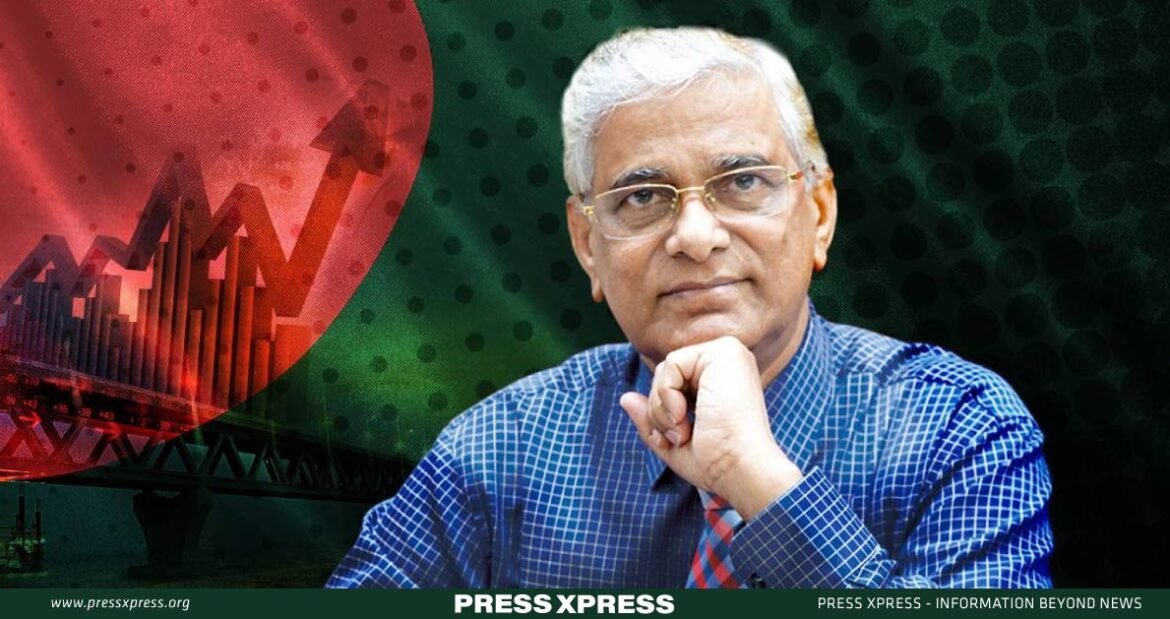Bangladesh’s economic ascent is nothing short of remarkable. Presently ranked 34th globally, its path is set to be even more astonishing. By 2036, it is poised to climb to the 24th position, propelling itself forward as a burgeoning economic powerhouse. The ultimate crescendo awaits in 2040, when Bangladesh is projected to emerge as the ninth-largest consumer nation on the planet.
In a recent discussion, economists offered diverse insights. Foreign institutions lauded its strengths, while local experts expressed reservations. They acknowledged inflation due to fuel hikes, hoping for relief soon. Others flagged concerns about inflation, supply shortages, and production costs, emphasizing reforms, resource optimization, and global price alignment.
State Minister of Planning, Shamsul Alam, remained optimistic about Bangladesh’s economic, highlighting systematic progress and downplaying concerns as not indicative of a nationwide crisis. Further details of the discussion are outlined below.
Managing Inflationary Challenges: Causes and Govt Response
When asked about the current predominant crisis of inflation in Bangladesh, Shamsul Alam answered that there is no crisis in the country’s economy as Bangladesh is moving ahead in a planned way while there is no weakness in the planning process.
“Bangladesh is under discomfort to some level due to the global situation, but the country is under no crisis,” he said.
The inflation surge in Bangladesh was triggered by the Russia-Ukraine conflict, causing a global supply system collapse, disrupting trade and escalating fuel and consumer goods prices worldwide. Bangladesh heavily relies on imports, including agricultural essentials like edible oil, sugar, onions, and more, further intensifying its dependency.
Post-Covid economic recovery globally heightened demand for raw materials, abruptly halted by the war-induced supply disruption. The resulting surge in global dollar demand and raised American Federal Bank interest rates aggravated the dollar crisis in countries like Bangladesh, sharply increasing its value against the Bangladeshi taka. This drastic currency devaluation and import cost rise added to existing inflationary pressures, driving up import expenses.
The government swiftly acted by curbing luxury imports, reducing import taxes, and refraining from contractionary monetary policies. However, despite global price drops, Bangladesh struggled due to sustained high import costs and increased production expenses, resulting in a double-edged inflation scenario—triggered by demand growth and elevated import expenditures. While global prices might decrease, local adjustments lag, creating a persistent inflationary trend in Bangladesh.

Expert Opinion: How the economic surge influences democracy?

Steps for Domestic Production
When come to the concern of domestic production of import-dependent products, further he said Attaining self-sufficiency in agricultural output would indeed be favorable for us. However, achieving this remains elusive. While we aim for self-reliance in rice production, its consistency isn’t guaranteed annually, leading to occasional shortages. Despite producing rice solely for domestic consumption without exporting any, there are instances where we resort to importing coarse rice.
In an equilibrium scenario where supply meets demand, prices should remain stable. Yet, our prices surge due to an imbalance: demand surpasses available supply, resulting in shortages. In years when our production adequately meets our demand, we observe price stability without notable increases.
Syndication in Markets
Syndication arises from production shortages. When supply matches demand, syndication doesn’t occur. Timely imports prevent supply shortages and syndication opportunities. Market rules govern prices, and ministries have no direct control over
fluctuations. Understanding price hikes is crucial, and the government must cater to both consumers and farmers. Our agricultural market needs to align more with market signals to prevent abnormal price rises. Importing on time can curb both price hikes and syndication without the need for forceful measures.
Raises Concerns Over Foreign Loans, Dollar Crisis
It was prudent to seek foreign loans during Bangladesh’s economic growth to fuel domestic investments, spur production, and enhance employment. Foreign loans supported advanced education-driven business endeavors, even allowing investments outside Bangladesh, resulting in global business expansions like pharmaceutical factories in the Philippines and businesses in Singapore.
Despite increased government debt, borrowing remains within the IMF’s recognized comfort zone for developing nations—between 40-43% of GDP. However, the critical focus now is assessing the loan utilization’s productivity. Projects funded by loans need to generate substantial returns for effective repayment.
Will the 2024 Foreign Debt Repayments Pose a Major Challenge?
Previously, a loan required careful consideration; now, it demands triple the scrutiny. Loans should not only be repayable in full but also contribute significantly to our economy’s strength and growth. Even private sector lending warrants heightened caution.
The mounting pressure of debt repayment coincides with our inability to bolster reserves despite exhaustive efforts, owing to deficits in financial accounts. Hence, proceeding cautiously is imperative. Comprehensive data on imports, exports, and exchange rates is crucial for informed decision-making.
Low tax-to-GDP ratio
In Bangladesh, indirect taxes dominate the revenue scene, lacking a modern, integrated system. Implementing electronic fiscal devices in shops and emphasizing digitalization across sectors could bridge these gaps.
There’s a need to reevaluate income tax, especially with a sizeable affluent population. Holding the National Board of Revenue accountable for equitable taxation and focusing on citizen income growth rather than just increasing revenue is vital. Restructuring high import taxes could also boost economic growth.
Stabilizing the economy amid political instability
The ties between economics and politics are tight. Stable politics leads to economic stability, while political instability breeds economic uncertainty. This instability affects trade, investment, and capital flow. Elections, often a time of financial uncertainty, contribute to this instability.
Stabilizing the economy becomes challenging amid political turbulence. Without political improvements, economic stability remains elusive. Prioritizing economic interests is crucial for both politics and democracy to thrive. Ultimately, for politics and democracy to endure, the economy must come first.
Dollar Crisis Solutions
- Advocates for leniency in dollar and gold imports
- Emphasizes transparent import-export transactions to counter money laundering
- Urges modernizing tax systems
- Focusing on income tax rather than indirect taxes
- Stresses the pivotal link between politics and economy


